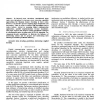Free Online Productivity Tools
i2Speak
i2Symbol
i2OCR
iTex2Img
iWeb2Print
iWeb2Shot
i2Type
iPdf2Split
iPdf2Merge
i2Bopomofo
i2Arabic
i2Style
i2Image
i2PDF
iLatex2Rtf
Sci2ools
104
click to vote
GLOBECOM
2006
IEEE
2006
IEEE
On the Parallelism of Convolutional Turbo Decoding and Interleaving Interference
— In forward error correction, convolutional turbo codes were introduced to increase error correction capability approaching the Shannon bound. Decoding of these codes, however, is an iterative process requiring high computation rate and latency. Thus, in order to achieve high throughput and to reduce latency, crucial in emerging digital communication applications, parallel implementations become mandatory. This paper explores and analyses existing parallelism techniques in convolutional turbo decoding with the BCJR algorithm. For component-decoder parallelism, we illustrate the influence of interleaving scheme and we propose new interleaving rules allowing to maximize parallelism efficiency.
Convolutional Turbo | Convolutional Turbo Codes | Error Correction | GLOBECOM 2006 | Telecommunications |
Related Content
| Added | 11 Jun 2010 |
| Updated | 11 Jun 2010 |
| Type | Conference |
| Year | 2006 |
| Where | GLOBECOM |
| Authors | Olivier Muller, Amer Baghdadi, Michel Jézéquel |
Comments (0)

